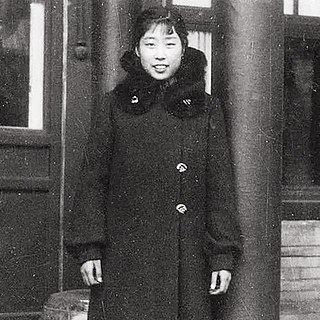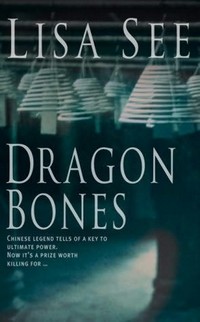
Turandot is an opera in three acts by Giacomo Puccini, posthumously completed by Franco Alfano in 1926, and set to a libretto in Italian by Giuseppe Adami and Renato Simoni.

Joan Chen is a Chinese-American actress and film director. In China, she performed in the 1979 film Little Flower and came to the attention of American audiences for her performance in the 1987 film The Last Emperor. She is also known for her roles in Twin Peaks, Red Rose White Rose, Saving Face, and The Home Song Stories, and for directing the feature film Xiu Xiu: The Sent Down Girl.
Lost in Translation is a novel written by Nicole Mones, published by Bantam Dell in 1999. It is the story of an American woman trying to lose her past by living as a translator in China. Emotionally charged and erotic, this widely translated bestseller has been universally praised for its authoritative portrayal of a China rarely captured in contemporary fiction. The novel's accolades include the Kafka Prize for the year's best work of fiction by any American woman, the Pacific Northwest Bookseller's Association Book Award for the year's best novel from the five northwestern states, and the New York Times Book Review's Notable Book and Editor’s Choice.

Red Guards were a mass student-led paramilitary social movement mobilized and guided by Chairman Mao Zedong in 1966 through 1967, during the first phase of the Cultural Revolution, which he had instituted. According to a Red Guard leader, the movement's aims were as follows:
Chairman Mao has defined our future as an armed revolutionary youth organization.... So if Chairman Mao is our Red-Commander-in-Chief and we are his Red Guards, who can stop us? First we will make China Maoist from inside out and then we will help the working people of other countries make the world red...and then the whole universe.

Tsai Chin is a Chinese actress, singer, director, teacher, and author best known in America for her role as Auntie Lindo in the film The Joy Luck Club.

Wang Guangmei was a Chinese politician, philanthropist and the wife of Liu Shaoqi, who served as the President of the People's Republic of China from 1959 to 1968.
David Hawkes was a British sinologist and translator. After being introduced to Japanese through codebreaking during the Second World War, Hawkes studied Chinese and Japanese at Oxford University between 1945 and 1947 before studying at Peking University from 1948 to 1951. He then returned to Oxford, where he completed his D.Phil. and later became Shaw Professor of Chinese. In 1971, Hawkes resigned his position to focus entirely on his translation of the famous Chinese novel The Story of the Stone, which was published in three volumes between 1973 and 1980. He retired in 1984 to rural Wales before returning to Oxford in his final years.

The Adventures of Marco Polo is a 1938 adventure film directed by Archie Mayo and starring Gary Cooper, Sigrid Gurie, and Basil Rathbone. It was one of the most elaborate and costly of Samuel Goldwyn's productions.

Raise the Red Lantern, originally known as Wives and Concubines, is a 1990 novella by Su Tong, published by Yuan-Liou Publishing Co. (遠流出版公司), that describes a female former university student whose mind is broken by the concubine system in 1930s China. It was adapted into the 1991 film, Raise the Red Lantern, by Zhang Yimou.

Lisa See is an American writer and novelist. Her books include On Gold Mountain: The One-Hundred-Year Odyssey of My Chinese-American Family (1995), a detailed account of See's family history, and the novels Flower Net (1997), The Interior (1999), Dragon Bones (2003), Snow Flower and the Secret Fan (2005), Peony in Love (2007) and Shanghai Girls (2009), which made it to the 2010 New York Times bestseller list. Both Shanghai Girls and Snow Flower and the Secret Fan received honorable mentions from the Asian/Pacific American Awards for Literature.

The Interior is the second novel in Lisa See's Red Princess series. The first is Flower Net and the third is Dragon Bones. In The Interior Chinese MPS inspector Liu Hulan and David Stark, an American attorney who loves her and is the father of her unborn child, try to find out whether Miaoshan, the daughter of Hulan's old friend Suchee, hanged herself or was murdered.

Dragon Bones by Lisa See (2003) is the third of the Red Princess mysteries, preceded by Flower Net and The Interior. Once again the protagonists Inspector Liu Hulan and Attorney David Stark return—this time as husband and wife.

Snow Flower and the Secret Fan is a 2005 novel by Lisa See set in nineteenth-century China. In her introduction to the novel, See writes that Lily, the narrator, was born on June 5, 1824—"the fifth day of the sixth month of the third year of the Daoguang Emperor's reign". The novel begins in 1903, when Lily is 80 years old. It continues on to tell the story of her life from birth, childhood, marriage, and old age. During her lifetime, Lily lives through the reigns of four emperors of the Qing dynasty: Daoguang (1820–1850); Xianfeng (1850–1861); Tongzhi (1861–1875); and Guangxu (1875–1908).

Nie Yuanzi was a Chinese academic administrator at Peking University, known for writing a big-character poster criticising the university for being controlled by the bourgeoisie, which is considered to have been the opening shot of the Cultural Revolution. She became a top leader of the Red Guards in Beijing, and was sentenced to 17 years in prison after the end of the Cultural Revolution.
In People's Republic of China (1949–), revolutionary operas or model operas were a series of shows planned and engineered during the Cultural Revolution (1966–1976) by Jiang Qing, the wife of Chairman Mao Zedong. They were considered revolutionary and modern in terms of thematic and musical features when compared with traditional Chinese operas. Many of them were adapted to film.
Chinese contemporary classical opera is a musical art form drawing on western opera traditions - distinct from modern developments of traditional Chinese opera.

A Flower in a Sinful Sea is a novel by Jin Tianhe and Zeng Pu. First published in serial installments beginning in 1904, the work is a roman à clef. The work was partially translated to English by Rafe de Crespigny and Liu Ts'un-yan in 1982. It was also translated to French and Russian.

The Journey of Flower is a 2015 Chinese television series starring Wallace Huo and Zhao Liying. It is based on the fictional novel of the same name written by Fresh Guoguo, which is inspired from Daoist legends regarding the path to immortality. The series was broadcast on Hunan TV every Wednesdays and Thursdays for two episodes per day, from 9 June to 7 September 2015.

Xin Fengxia was a Chinese pingju opera performer, known as the "Queen of Pingju". She was also a film actress, writer, and painter. She starred in the highly popular films Liu Qiao'er (1956) and Flowers as Matchmakers (1964), both adapted from her operas.
Isao Sato was a Japanese born theater actor. He was born in Tokyo on June 27, 1949 and attended the Keio University, where he studied law. While in Japan, he was a member of the Shiki Theatre Company. His broadway debut was in the original all Asian cast of Pacific Overtures in 1976 where he played Kayama. He was the only non-American member of the cast. In fact, he came to America specifically to audition for this role, after having missed the Tokyo auditions for the musical. Once he was cast, he emigrated to America. Reviews for the show were mixed, but Sato received praise for his performance. He was nominated for a Tony Award for Best Featured Actor in a Musical in 1976, but lost to Sammy Williams of A Chorus Line. His voice can be heard on the cast recording of Pacific Overtures. In 1979, he played several roles in the play Fanshen about the Chinese revolution at the ACT Theatre in Seattle. He later played Wenqing in Peking Man, a play by Cao Yu at the Horace Mann Theater in New York City in 1980. At the Perry Street Theater in New York City, he acted in Dick Brukenfeld's historical drama "Extenuating Circumstances", wherein an American man is accused of killing a young Chinese girl in Canton, China in 1821.















